Politics
Anti-Tinubu Coalition: Still Seeking Momentum
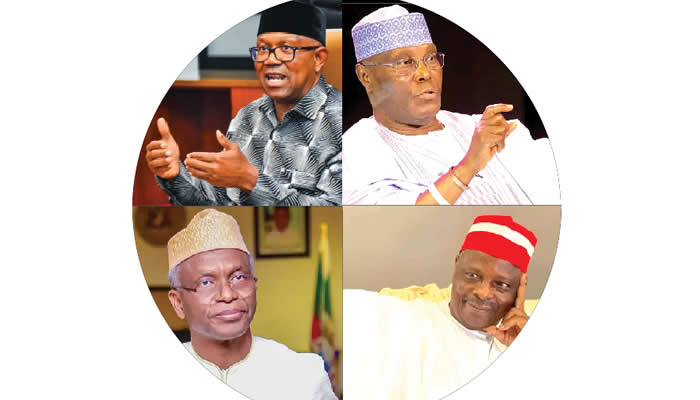
The coalition of opposition leaders spearheaded by former Vice President Atiku Abubakar and Labour Party’s 2023 presidential candidate, Peter Obi, which once gained significant momentum, is now losing steam, reducing to exploratory talks marked more by shared opposition to President Bola Tinubu than a coherent ideological vision, according to Punchng.com.
Nigeria’s current socio-political landscape closely mirrors that of 2013, when the country was charged by intense moves of opposition leaders plotting to unseat the then President Goodluck Jonathan. Widespread discontent and mounting national crises had spurred the coalition of opposition parties against the Jonathan’s administration.
The 2013 coalition, spearheaded by former Lagos State governor and now President Bola Tinubu, capitalised on growing public distrust, economic mismanagement, and unabated terrorism activities under Jonathan’s government to build strong political momentum.
The alliance leveraged the political strength of existing parties at the time, such as the Action Congress of Nigeria, the All Nigeria Peoples Party, the Congress for Progressive Change, and a faction of the All Progressives Grand Alliance, to form a united front that ultimately drove the PDP from power two years later.
At that time, the ruling Peoples Democratic Party was battling with deep internal fractures, which led to the defection of five governors out of the seven who staged a dramatic walkout during its national convention held at the Eagles’ Square in Abuja on August 31, 2013. The PDP subsequently splintered into factions that cracked its national dominance and shifted the political climate in favour of the Tinubu-led coalition that birthed the All Progressives Congress.
Back at same spot 12 years after
Nearly 12 years later, Nigeria has found itself at a similar turning point where a mix of economic crisis, rising insecurity and political disaffection have emboldened some opposition heavyweights to plan a formidable coalition against President Tinubu.
On March 20, 2025, former Vice President Atiku Abubakar, Labour Party’s 2023 presidential candidate, Peter Obi, and ex-governor of Kaduna State, Mallam Nasir El-Rufai, announced the formation of a coalition aimed at unseating the APC-led administration in the 2027 elections.
In a recent post on his X handle, Atiku outlined the mission of the emerging alliance. “We are building a strong, united opposition coalition — one that will challenge the excesses of this administration, restore accountability, and return government to the people.
“We will protect the right of every Nigerian to freely choose their leaders, and we will continue to fight for economic justice, political freedom, and national progress. We are here to rescue Nigeria. And we will not stop until that goal is achieved,” he posted.
To achieve national spread, the Atiku/Obi-led coalition brought in prominent figures such as former Rivers State governor, Rotimi Amaechi, his Cross River counterpart, Liyel Imoke, former Secretary to the Government of the Federation, Babachir Lawal, former Kano State governor, Ibrahim Shekarau, and several other northern political heavyweights.
In a strategic move for political realignment, Obi has held private meetings with former Jigawa State governor, Sule Lamido and former Senate President, Bukola Saraki in recent months. The coalition leaders also met weeks back with some northern power blocs in a bid to rally support for the anti-Tinubu alliance in the region.
The meeting, convened by the National Political Consultative Group (North) had in attendance prominent figures including former Chairman of the PDP Board of Trustees, Adolphus Wabara, and former Attorney General of the Federation and Minister of Justice, Abubakar Malami, SAN.
All talks, no clarity
Many political analysts have expressed mixed reactions over the coalition drive and prospects of opposition unity to achieve its agenda. While some observers see the coalition’s formation as a significant realignment in Nigerian politics, others regard it as sheer exploratory talks which lack ideological clarity beyond the anti-Tinubu sentiments.
In terms of leadership and power dynamics, some observers argue that the Atiku/Obi alliance is still in its consultation phase, and it is quite premature to assess its potential impact. Others, however, contend that the coalition could be undermined by internal power struggles, as its leading figures, Atiku and Obi, have competing ambitions, while the roles of several other prominent allies like El-Rufai remain unclear.
Another counterargument against the ongoing coalition is that some of its arrowheads appear to lack the political weight and mass appeal needed to unseat a dominant ruling party like the APC.
Atiku, who has been the major driver of the alliance, doesn’t have the credibility or command the kind of mass appeal that Buhari had in 2013 due to how he has been moving from one party to another, according to the President, National Association of Political Scientists, Prof Hassan Salisu.
“Buhari’s personality gave substance to the coalition in 2013. He was seen as somebody capable of doing so many things. But there’s nobody that’s very inspiring in the new coalition, not even Atiku.
“Also, Obi doesn’t have the kind of followership that Buhari had. Secondly, there are doubts whether he can retain the same number he had in 2023 this time around because of some developments,” Salisu explained.
But the Atiku’s staunch supporters argue that even Buhari switched political parties before he achieved his presidential ambition after his military stint. They add that cross-carpeting is a familiar trend among the politicians.
Atiku left the PDP for Action Congress in 2006 where he contested the presidential election in 2007, polling 2.6 million votes. He returned to the PDP in 2009, and later joined APC in 2013.
In 2017, Atiku left APC for PDP and got the party’s ticket to contest the 2019 presidential election. He polled 11.2 million votes to come second to Buhari. Atiku also failed to leverage his region’s voting strength to defeat the APC presidential candidate, Tinubu in 2023 as he got 6.9 million votes.
Some Nigerians considered Atiku as someone lacking ideological consistency and driven solely by personal ambition. Others, however, argue that Obi’s debut in the presidential race significantly undercut Atiku’s chances, especially given the former Anambra governor’s strong appeal among the youth.
The pro-Atiku analysts stated that the former vice president would have defeated Tinubu with a landslide had Obi not run against him.
But others believe the Atiku-Obi alliance still wouldn’t have stopped the APC’s return to power as the pair could only muster 11.2 million votes in the 2019 poll despite the widespread dissatisfaction with Buhari’s first-term performance.
Amid the controversies, it has been argued that the fragile state of the opposition parties and their conspicuous absence from the coalition struggle may be another big stumbling block.
Counting opposition losses
Back in 2013, the opposition bloc that collapsed its structures into the APC was formidable enough to pull in governors and heavyweight politicians from the then ruling PDP. The likes of Amaechi, Rabiu Kwankwaso (Kano), Aliyu Wamakko (Sokoto), Murtala Nyako (Adamawa), Abdulfatah Ahmed (Kwara), who were all governors at the time, dumped the ruling PDP to pitch tent with the opposition APC.
Today, however, the leading opposition parties, notably the PDP, LP, and New Nigeria Peoples Party have been grappling with internal crises that have cost them key political figures.
Beyond losing over 30 lawmakers to the APC in the National Assembly over the past two years, the opposition has also ceded some of its former strongholds across the federation, including Delta State, to the ruling party. Before the 2023 general elections, opposition parties controlled 16 states, 15 of which were held by the PDP, while the APC had 20 states. But the political map has since changed. The APC now controls 23 states, while the opposition holds 13 with the PDP accounting for 10, while APGA, NNPP, and LP control one state each.
In what could be seen as a potential setback for the ongoing coalition, leading opposition parties, including the PDP and LP, have publicly distanced themselves from the alliance talks. On April 14, 2025, the PDP governors declared at a meeting that the party would not join any coalition.
Similarly, the Labour Party, in a 12-point resolution adopted at the National Executive Council meeting of the party on May 2, 2025 in Abuja, said it will not enter into any coalition or alliance ahead of the 2027 general elections.
It has been argued in some quarters that the absence of the major opposition parties from the coalition will weaken its prosperity, resulting in a fragmented front to the advantage of the APC.
However, both Atiku and Obi’s camps have, at different forums, affirmed their readiness to either adopt one of the existing political parties or create a new platform to mount a strong challenge against the APC. Initially, the coalition had wanted to adopt the SDP but the party’s leadership rejected the move. The African Democratic Congress is now considered as the platform of the coalition to challenge Tinubu in 2027.
Amid the uncertainties, a chieftain of the PDP, Segun Sowunmi, maintained that ultimately, only one party would emerge as the coalition’s platform of choice, and only one individual can become its presidential candidate.
“As far as I am concerned, I don’t believe they are building any coalition. What I think they are doing is what you call ‘forum-shopping,’ looking for a platform that suits their ambition. That kind of effort can only serve one person. But if too many of them are chasing the same goal, well, good luck to them,” Sowunmi told Sunday PUNCH.
Atiku/Obi allies speak
Speaking to Sunday PUNCH, Atiku’s media aide, Paul Ibe, dismissed any negative claims against the coalition’s agenda. He said, contrary to widespread reports, there would be no clash of interests among the coalition leaders. “Atiku, Obi, and other coalition stakeholders are in talks, and once concluded, they will make the way forward public,” Ibe stated.
He insisted that those who believe internal conflicts will tear down the coalition are Tinubu’s loyalists, who are bent on turning Nigeria into a one-party state. “The coalition will succeed and ultimately provide Nigerians with a viable platform to reclaim and rebuild the country in line with their aspirations,” the Atiku’s aide affirmed.
In his comment, Obi’s ally, Peter Ameh, added that the coalition movement remained steadfast in its mission to foster steady, organic growth, prioritising unity and connection with the everyday struggles of Nigerians.
He said the formation strongly believed that sustainable progress is essential for building a coalition that resonates with the majority, particularly the common man on the street, who he said continues to bear the brunt of the current administration’s failure to deliver effective governance. “Contrary to some observers’ narrow assertions, our movement is not driven by any particular individual or group of individuals, but rather by the collective desire of the Nigerian people to see a change in governance,” Ameh added.
As Atiku, Obi, and others continue to champion the anti-Tinubu coalition agenda, the sharp contrast between this unfolding movement and the 2013 experiments is fuelling growing doubts about how far the current alliance can truly go in its bid to unseat the ruling APC. Will it succeed in the long run despite the visible cracks? Can it hit its target without the full cooperation of the established opposition giants? Only time will tell.
Politics
INEC Rejects Mohammed As PDP Acting Chairman

The Independent National Electoral Commission (INEC) has rejected a letter submitted by the Samuel Anyanwu faction of the Peoples Democratic Party (PDP), declaring that the correspondence “failed to meet the requirements of the law.”
According to The Nation, the letter, jointly signed by Abdulrahaman Mohammed and Senator Samuel Anyanwu, had sought the postponement of the Ekiti Governorship Primary scheduled for November 8, 2025.
The faction claimed that “logistical reasons” made it impossible to conduct the exercise as planned.
In the letter dated November 6, 2025, titled “Postponement of PDP Ekiti State Congress/Governorship Primary,” the faction told the commission that a new date would be communicated.
Part of the letter read, “We wish to inform you that the PDP Ekiti State Congress and Governorship primary scheduled for November 8, 2025, has been postponed due to logistical reasons constraining this exercise… Please accept the assurances of my esteemed regards.”
Despite the request, the PDP went ahead with the primary on November 8, with Dr. Wole Oluyede emerging winner after polling 279 votes to defeat Funso Agent (239 votes) and Funmilayo Ogun (17 votes).
In its response dated November 10, 2025, and addressed to the PDP National Secretary under reference number INEC/DEPM/PDF/286/94, INEC declared the request invalid.
The letter, signed by the Commission’s Secretary, Mrs. Rose Oriaran Anthony, stated that the notice did not comply with the 2022 Regulations and Guidelines for Political Parties.
The letter reads, “The Commission draws your attention that the notice is not in compliance with the requirement of Part 2(12)3 of the Regulations and Guidelines for Political Parties, 2022, which provides that ‘the National Chairman and National Secretary of the Party shall jointly sign the notice of convention, congress, conference or meeting and submit the same to the Commission.’ Be guided.
The Commission hereby informs you that it has rejected your submission for non-compliance with the requirements of the Electoral Act.”
The commission’s firm position effectively invalidates Abdulrahaman Mohammed’s claim to be acting national chairman of the PDP.
Politics
Tension At Wadata Plaza As Rival PDP Factions Storm Secretariat Amid Heavy Security

Tension At Wadata Plaza As Rival PDP Factions Storm Secretariat Amid Heavy Security
There is heightened tension at the national headquarters of the Peoples Democratic Party (PDP), Abuja, as two rival factions claiming leadership of the party moved to hold parallel meetings at the same venue.
Heavily armed security operatives cordoned off major sections around Wadata Plaza on Tuesday, anticipating clashes between loyalists of Senator Samuel Anyanwu and the newly elected National Working Committee led by Tanimu Turaki.
Members of the Anyanwu-led National Working Committee were the first to arrive at the secretariat on Tuesday morning.
Speaking to journalists shortly after settling into his office, Anyanwu declared that he remains the substantive National Secretary of the party until December, stressing that no leadership announcement or convention outcome could invalidate his tenure.
He brushed aside reports of his expulsion by the Turaki group, insisting that due process had not been followed.
Responding to questions about whether he had invited the security operatives stationed outside the premises, Anyanwu confirmed that he had.
According to him, it is standard practice for the PDP to request the presence of security agencies whenever major party meetings are scheduled.
He added that the security operatives were also positioned to handle any “intruders,” a comment widely interpreted as a warning to the Turaki-led exco, which had also summoned its own emergency meeting at the same national headquarters.
The Turaki-led leadership had, on Monday, written to the police to alert them of what they described as plans by expelled officers to disrupt activities at the party secretariat.
Politics
PDP Elects New National Chairperson

The Peoples Democratic Party (PDP) has elected Kabiru Turaki (SAN), the former minister of special duties and intergovernmental affairs, as its new national chairman at its ongoing national convention.
Turaki’s emergence at the convention, which was being held in Ibadan, the Oyo state capital, where delegates from 17 states in the country cast their votes to elect national officers.
The new PDP national chairman was a minister under the administration of former President Goodluck Jonathan.
At the ongoing convention, the party had earlier announced the expulsion of the Minister of the Federal Capital Territory (FCT) and former governor of Rivers state, Nyesom Wike. The PDP suspended Wike, along with the former governor of Ekiti, Ayodele Fayose, and the former national secretary of the party, Samuel Anyanwu.
The motion for the expulsion of the party leaders was moved by Olabode George, the former national vice chairman of the PDP. His motion was supported by Samaila Burga, the PDP chairman in Bauchi state.
Others who were expelled included the PDP’s national legal adviser, Adeyemi Ajibade (SAN), AbdulRahman Mohammed, George Turner, Dan Orbih, Umar Bature, Austin Nwachukwu, Mao Chuambuwa, and Abraham Ammah.
However, the expulsion of Wike and others has been rejected by the PDP have been rejected by Governor Ahmadu Fintiri and Caleb Mutfwang of Adamawa and Plateau states.
Governor Mutfwang, in a statement, distanced himself from the motion seeking the expulsion of the PDP leaders. Mutfwang, through his director of press and public affairs, Gyang Bere, said that the development did not reflect his position.
According to Vanguard, the governor explained that the motion was never discussed at the PDP governor’s forum, nor was it tabled at the PDP National Executive Committee (NEC) meeting. He stressed that such a move would be counter-productive as the PDP was trying to be stabilized and that the expulsion could further polarize the party rather than uniting it.
Also, Adamawa Governor Fintiri distanced himself from the expulsion of Wike, adding that he strongly believes that the decision was not in the best interest of the PDP and that such a decision would further polarize the party.
Governor Fintiri reiterated that he remains a faithful PDP member and that he would not be part of anything that would further polarize the party. He added that “I believe that peace and reconciliation are the only ways forward for our great party.”
-
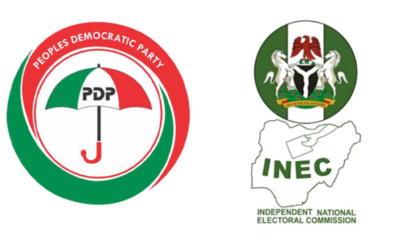
 Politics2 days ago
Politics2 days agoINEC Rejects Mohammed As PDP Acting Chairman
-
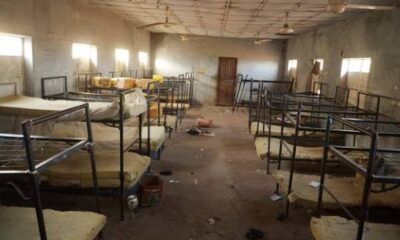
 News2 days ago
News2 days agoNames Of Kidnapped Kebbi School Girls Released
-
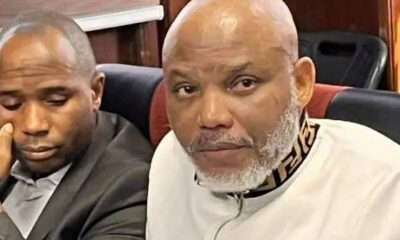
 News24 hours ago
News24 hours agoJudge Declares Nnamdi Kanu An ‘International Terrorist’
-

 News1 day ago
News1 day agoNAF Launch Fresh Airstrikes On Terrorists Hideout In Sambisa Forest
-
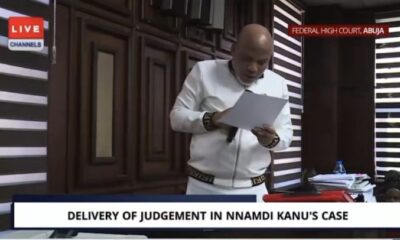
 News23 hours ago
News23 hours agoCourt Finally Delivers Judgement In Nnamdi Kanu’s Terrorism Case
-
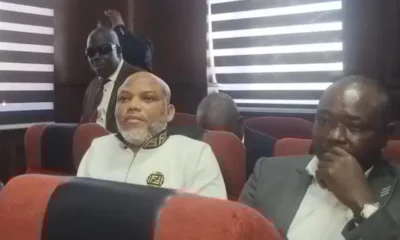
 News23 hours ago
News23 hours agoJust In: FG Urges Court To Impose Death Sentence On Nnamdi Kanu
-
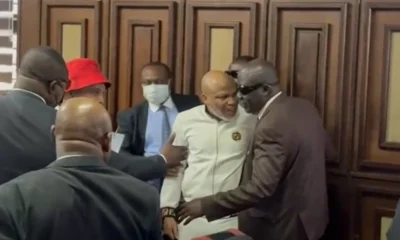
 News22 hours ago
News22 hours agoBREAKING: Court Sentences Nnamdi Kanu To Life Imprisonment



